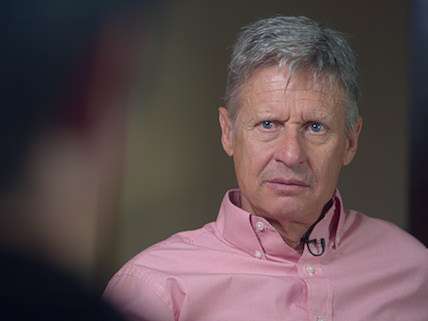More on Richmond Times-Dispatch Endorsement of Libertarian Gary Johnson for President
The former New Mexico governor won't win in November but he does represent the future of policy.

Scott Shackford blogged The Richmond Times-Dispatch endorsement of Libertarian Gary Johnson for president. The major daily located in Virginia's capital argues that Johnson, a former two-term governor of New Mexico and a successful businessman, is "the most capable and ethical candidate running this year."
In a companion piece to its endorsement, the editorial board (which includes Reason contributor A. Barton Hinkle), discusses more of what they consider Johnson's selling points:
Our instincts had pointed us toward Johnson. His meeting with the editorial board removed all doubts. Our endorsement conveys enthusiasm. His person and his policies embody what either the Democrats or the Republicans ought to offer the electorate. The formal endorsement of Johnson appears on the front of the Commentary section. It cites specific reasons for our choice. The editorial above explains the endorsement in the context of the Creed, our annual recitation of our philosophical roots. In endorsing Johnson, we remain true to ourselves. Indeed, he and running mate William Weld are true to the ideals that have motivated us for many years. Johnson represents a future one of the major parties ought to adopt as its own. He appears immune to the social Darwinism that infects extreme Libertarians and misguided conservatives; he projects empathy. Trump's temperament is not first-class; there is no evidence of an intellect. Clinton's ethical lapses are disabling. Johnson enjoys a decisive edge.
It's worth lingering for a moment over the above paragraph for at least two reasons.
First is the observation that Johnson and his running mate, former two-term Massachusetts Gov. Bill Weld, are not "extreme Libertarians." Indeed, the ticket has taken a huge amount of abuse among longtime LP members and small "L" libertarians precisely for not being super-doctrinaire when it comes to ideological orthodoxy. Some of this is simply concern trolling (especially from conservative Republicans) and much of it is overstated (Johnson is, for instance, against carbon taxes and fully defends Second Amendment rights). But there's no question that Johnson and Weld depart from standard-issue libertarian positions on things such as anti-discrimination laws; the attention he pays to Black Lives Matter bothers not just conservatives but some true-blue libertarians as well who eschew invocations of race in almost any context. This sort of tension is widely misunderstood, I think. The issue isn't really whether the LP has run candidates who weren't perfectly in sync on issues (think former congressman Bob Barr in 2008). It's more that Johnson-Weld are truly credible and serious candidates. That shifts the party's identity and role from one of ideological outreach to actually being serious about winning and influencing elections. With that shift comes serious questions about the level of orthodoxy in candidates vs. their electability (something similar was at play in the recent Virginia campaigns by Robert Sarvis for governor and senator). It's not a small sort of growing pain, but given that Johnson is polling far, far better than any other presidential nominee in LP history, fighting over orthodoxy and specific candidates is a sign of success.
Then there's this: "Johnson represents a future one of the major parties ought to adopt as its own." I think this is not only true but likely. If the Libertarian Moment is in any sense taking place (and it is), major politicial parties of the near future will indeed be shrinking the size, scope, and spending of government. They will become "fiscally conservative and socially liberal," as Johnson says. That's driven less by ideological commitments and more by pragmatic concerns. The reality is that entitlements, defense spending, and interest on the debt are writing a check the future can't cash. We're already at a place where about 3/4 of federal spending is mandatory and yet both Donald Trump and Hillary Clinton are talking about spending even more money than we already do. Clinton would raise taxes, which has the benefit of not totally blowing out the debt levels even as it will help make economic growth that much more sluggish. Trump would simply give up on anything approaching fiscal sanity. But it's also true that Americans consistently say that we want a government that does less and spends less. It's easy to say that people always say that in the abstract, but as the deadlines for actual cuts in Medicare and Social Security benefits come into view, Johnson is the only candidate who is trying to have an adult conversation about the purposes and sustainability of safety nets. When it comes to social issues, formerly controversial topics ranging from gay marriage to pot legalization to abortion are losing their ability to whip voters in to frenzies. The future belongs to a party that says something like: We will do fewer things but do them competently; we will spend less of your money even as we help those truly in need; we will give individuals more choices in living their lives when it comes to education, marriage, and work; and we will be fair.
On Labor Day weekend, it looks less and less likely that Johnson will be in the presidential debates, which get started later this month. The candidate himself has said if he's not in the debates, it's "game over" for any chance to win the election. But that ultimately isn't the real measure of his—and the LP's—influence on 21st-century politics. Keep a copy of Johnson's platform tucked away somewhere. Over the coming years, we'll see most if not all of what he's proposing will be baseline assumptions for one or both major parties.
Matt Welch and I did a Facebook Live interview with Johnson at the Democratic National Covention in Philadelphia. Take a look now:


Show Comments (134)